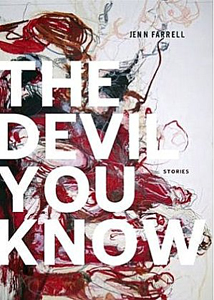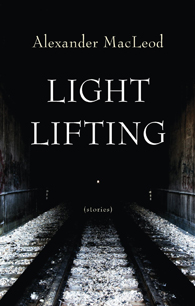Reviews
Fiction Reviews by June Halliday
Jenn Farrell, The Devil You Know (Vancouver: Anvil, 2010). Paperbound, 128 pp., $16.
Alexander MacLeod, Light Lifting (Emeryville: Biblioasis, 2010). Paperbound, 224 pp., $19.95.
The Devil You Know picks at some raw wounds. In her second collection of stories, Jenn Farrell fearlessly explores difficult territories, including love, sex (in varied forms), addiction, abandonment, religion, control, friendship, power, and pain—both physical and emotional. She elucidates abstract landscapes using images apt to the characters: a half-eaten jar of marshmallow fluff, blinking Christmas lights, the smell of nicotine on skin, exposed thighs gleaming under streetlights, black electrical tape. The Devil You Know has a distinctly urban thrust, with many of the stories taking a voyeuristic view of small-town girls trying to make their way in big cities. The reader watches them discover that it’s the same shit, different town.
Jenn Farrell fearlessly explores difficult territories, including love, sex (in varied forms), addiction, abandonment, religion, control, friendship, power, and pain—both physical and emotional. She elucidates abstract landscapes using images apt to the characters: a half-eaten jar of marshmallow fluff, blinking Christmas lights, the smell of nicotine on skin, exposed thighs gleaming under streetlights, black electrical tape. The Devil You Know has a distinctly urban thrust, with many of the stories taking a voyeuristic view of small-town girls trying to make their way in big cities. The reader watches them discover that it’s the same shit, different town.
Although there are male characters and narrators throughout, the voice of the collection is distinctly feminine. “Grimsby Girls” examines the intricacies of the internal female mind. What are our most private thoughts? What are our most private places? “Soft Limits,” which has some satisfying parallels to Nancy Lee’s “Associated Press,” allows entry into the mind of a woman experimenting with BDSM. “[A] catchall term for Bondage and Discipline, Domination and Submission, and Sadism and Masochism,” the narrator learns from online chat groups. Even while engaging in intensely physical acts, the narrator is continually analyzing her position:
Sometimes the power and pain is restricted to the bedroom, while others are collared and shackled, or have to sit on the floor, even for meals. I try not to judge their choices, but I can’t help but contemplate the line between submission and victimization. Is there a difference between being dominated and being abused? And where does all of this leave me?
Complex, multi-layered sentences and language achieve a “simple” colloquial voice that is not simple to achieve. The youthful voice was grating to read at times; a little too colloquial and fickle—in “Tested,” for example, the voice was as disposable as the pregnancy test—but perhaps that was the intention. Farrell’s dialogue carries a deft accuracy and sarcastic wit. In “Day of the Dead,” a young hairdresser stands over her mother’s corpse: “‘Oh, Mom,’ [she says]. ‘You look terrible.’ If she had come sooner, she could have at least cleaned her up a bit.”
Light Lifting, Alexander MacLeod’s debut collection (shortlisted for the 2010 Giller  Prize), is rich with layers of the everyday: a bagged lunch, the 401, brick patios, Grand Caravans, aquatic centres, the elements. He writes stories of contemporary sub/urban Canada. A series of odd jobs—from bricklayer to lifeguard—provides a unique thread and these seven stories are grounded in the concrete reality of setting. From the directions given in “The Number Three,” a reader could retrace the narrator’s thirty-mile walk on the highways and freeways near Windsor, Ontario.
Prize), is rich with layers of the everyday: a bagged lunch, the 401, brick patios, Grand Caravans, aquatic centres, the elements. He writes stories of contemporary sub/urban Canada. A series of odd jobs—from bricklayer to lifeguard—provides a unique thread and these seven stories are grounded in the concrete reality of setting. From the directions given in “The Number Three,” a reader could retrace the narrator’s thirty-mile walk on the highways and freeways near Windsor, Ontario.
MacLeod’s writing is verb-rich, with a masculine physicality. His characters are active and alive; they lift, run, punch, dive, and build, creating a tension the reader feels in the body. “Adult Beginner I” is experienced rather than read. There is a striking simplicity to the sentences in Light Lifting, yet complex meanings surface in some incredible lines. “All the lights on in our house. Three in the morning. Something wrong.” The reader knows something is wrong after the first four words but MacLeod’s short clipped sentences increase the sense of urgency. There is also poetry in the fragments as in “The Number Three”:
But there is something else, too. Something a person has to see at least once. The way an entire field [of geese] can take off at the same time. The land deciding to become the sky. Everything lifting at once. Tight formations and instinctive patterns. That V writing itself on the clouds. You look at that and you don’t forget you saw it. It can make you believe in order if you are the kind of person who wants to believe in order.
MacLeod explores the boundaries and limitations of relationships, revenge, fear, parenting, loss, regret, and failure, as well as physical pain and moments of transformation. How far can we push ourselves? How far can we fall? In “Wonder About Parents,” the narrator’s struggle to get through the head lice infestation in his household is a metaphor for getting through life as a family—together. Particular attention is paid to the stages of life; MacLeod delves into creepy childhood memories in “The Loop” and aging athletes in “Miracle Mile.” Adolescent violence is explored in “Good Kids” as brothers test their limits. And the consequences of not behaving like adults, is highlighted in the title story: “The sun just kept streaming down on us, all bright and summery. It wasn’t right and I kept wishing for it to be darker so I didn’t have to see it all so clearly.”
If The Devil You Know tends toward the dark, Light Lifting tends toward the light. However, both linger in the shadows and the pithy corners where the best stories lie. MacLeod and Farrell have produced concrete evidence that there are still plenty of potent, human stories to tell.
—June Halliday









